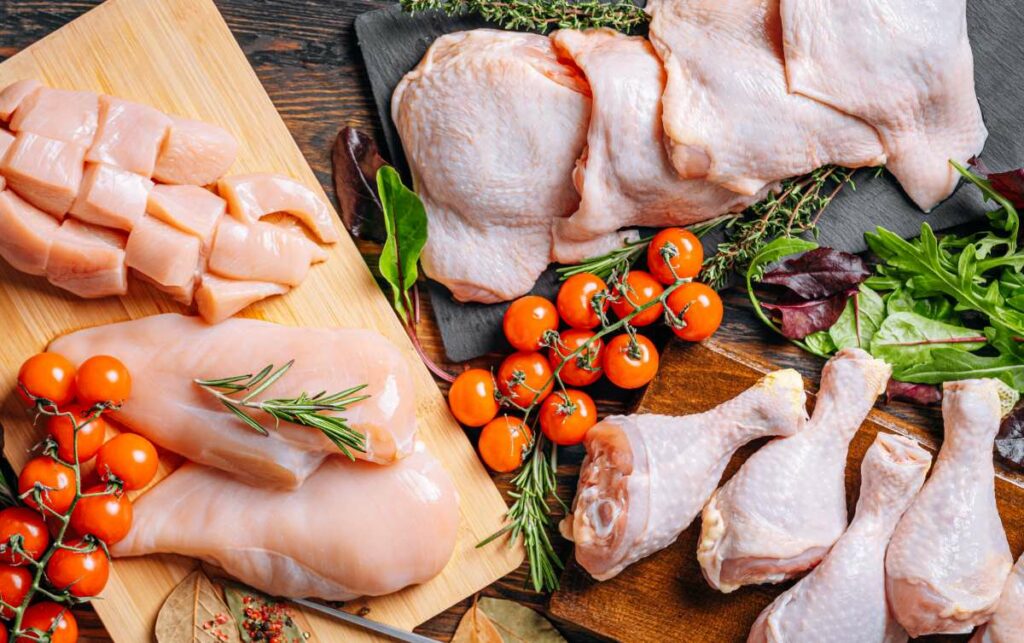There are a lot of discussions these days about food safety, and with good reason. We all want to know that our food is safe and won’t make us sick. Experts agree that food safety is paramount in raising and caring for poultry. We’ll discuss some necessary steps we can take to keep our poultry safe from harm.

Proper Handling Is Critical From Farm To Table
Poultry meat is a delicious and nutritious part of many people’s diets. However, it can also be a source of foodborne illness if mishandled. To ensure the safety of poultry meat, farmers and processors must take several precautions. First, the chicken coops must be kept clean and free of debris. The birds must also be regularly inspected for signs of illness.
Once the chickens are slaughtered, the meat must be quickly cooled to prevent the growth of harmful bacteria. The poultry meat is then typically packaged in sealed containers to keep it fresh and uncontaminated. Finally, the poultry is transported to grocery stores or other retail outlets, where it is kept refrigerated until sold. By following these safety procedures, farmers and processors can help to ensure that poultry meat is safe to eat.
Of course, the safety of poultry meat does not end at the farm gate. It is also critical that consumers handle and cook the meat properly. Raw chicken should always be kept separate from other food items in the kitchen. It should also be cooked thoroughly to kill any harmful bacteria that may be present. It is also essential to wash your hands and avoid cross-contamination when preparing poultry. By following these simple guidelines, you can help to ensure that your family enjoys safe and delicious chicken meals.
The Dangers of Contaminated Poultry
While poultry meat is generally safe to eat when properly handled, there are always risks associated with consuming any type of raw meat. If poultry meat is contaminated with harmful bacteria, it can cause food poisoning. Symptoms of food poisoning include nausea, vomiting, diarrhea, and abdominal cramps. In severe cases, food poisoning can lead to hospitalization or even death.
Contaminated poultry can also seriously threaten pregnant women and their unborn babies. Listeria is a type of bacteria that can be found in contaminated poultry. A pregnant woman who consumes contaminated chicken may suffer from a miscarriage or stillbirth. For this reason, pregnant women need to avoid eating raw or undercooked poultry.
Types Of Bacteria That Can Negatively Affect Poultry Meat
Several different types of bacteria can contaminate poultry meat. Some of the most common include Salmonella, Campylobacter, and E. coli. These bacteria can cause severe illness in humans and even death.
Salmonella is one of the most common types of foodborne illness. It is typically found in raw chicken or eggs. Symptoms of salmonella poisoning include diarrhea, vomiting, and fever. In severe cases, it can lead to hospitalization or death.
Campylobacter is another type of bacteria that can be found in poultry. It can cause diarrhea, vomiting, and abdominal cramps. In severe cases, it can also lead to paralysis.
E. coli is a type of bacteria typically found in undercooked beef. However, it can also be present in poultry meat that has not been properly cooked. E. coli can cause severe illness, including bloody diarrhea and kidney failure. In some cases, it can even be fatal.
How You Can Help Prevent Contaminated Poultry
There are several steps that consumers can take to help prevent contaminated poultry from reaching their dinner tables. First, it is essential to buy chicken from reputable sources. Check the labels on chicken products to ensure that they have been raised and processed in clean and safe conditions.
Also, be sure to cook chicken thoroughly before eating it. Chicken should be cooked to an internal temperature of 165 degrees Fahrenheit to kill any harmful bacteria that may be present. It is also essential to wash your hands and avoid cross-contamination when preparing poultry. By following these simple guidelines, you can help to ensure that your family enjoys safe and delicious chicken.
When handling raw chicken, follow the safety guidelines we discussed earlier. This includes refrigerating the meat, cooking it thoroughly, and avoiding cross-contamination. Finally, don’t hesitate to contact your local health department if you have any concerns about the safety of poultry products in your area.
Final Thoughts
Poultry meat is a staple in many diets around the world. Handling poultry meat properly from the farm to your dinner table is important. Processors and retailers take many steps to ensure that poultry meat is safe for human consumption. Still, we all have a role in preventing contaminated poultry meat from reaching our dinner tables. Following the simple steps outlined in this article can help keep yourself and your family safe from the dangers of contaminated poultry meat.




